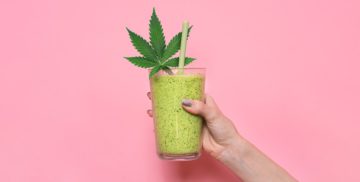Thanks to anecdotal stories in the media CBD oil had a recent surge in popularity as a remedy for Depression. Headlines that consistently pop up are – “CBD has cured my depression” or “I no longer suffer anxiety since taking CBD”.
These anecdotal stories are one thing, but is there any scientific study to quantify the claims made?
What does the research surrounding using CBD for depression say? Could you be using CBD oil to help with depression?
CBD & Depression: What the Science Says?
The preclinical studies surrounding CBD have shown that it may have potential uses with regards to treating generalized anxiety disorder, sleeping disorders, panic disorder, obsessive-compulsive disorder, PTSD and depression. The studies conducted have shown that the effectiveness of CBD in these cases seems to come from short term use in which the subjects receive high doses (>400 – 600 mg per day).
The studies suggest that CBD works most effectively when the subjects are actively in a state of mind in which they want to help themselves. Showing that CBD is more of a tool to be used in conjunction with a positive and healthy lifestyle and not a cure for depression.
It appears to make the associated symptoms of the aforementioned conditions easier i.e. stress, which in turn creates an environment in which the user is able to deal with day-to-day life more effectively. Users who take CBD appear to have a higher drive to exercise and to be social, which has in turn shown to help alleviate the symptoms of anxiety.
CBD – How Does It Work?
CBD is part of a group of compounds called cannabinoids. The body produces its own naturally occurring cannabinoids (such as anandamide) that interact with the bodies endocannabinoid system. You also have cannabinoids that are produced within the cannabis plant of which there are around 100 that have been discovered.
As researchers have delved deeper into their understanding of these cannabinoids, people have discovered that they hold certain medicinal qualities. Studies have been conducted on their isolated and pure forms. One such cannabinoid that has taken the media by storm is CBD. However, there are lots of misconceptions around the level of scientific understanding that is held by it.
The Effect Of CBD On The Body
Scientists have discovered that the bodies of humans as well as almost all life from mammals, reptiles & fish etc… contain complex endocannabinoids systems in which cannabinoids can interact. Humans contain these receptors in the brain, nervous system, organs, tissues and on the surface of our skin.
This endocannabinoid system is known for the regulation of memory, pain, appetite, reward, addiction amongst a variety of different mechanisms. Each individual cannabinoid affects the endocannabinoid system in different ways, resulting in different physical and physiological effects. Research has been conducted on CBD to see what these effects are in conjunction with many different disorders.
In The UK – Is It Legal To Take CBD Oil For Depression?
Even though it comes from cannabis, CBD doesn’t get the user ‘high’ or ‘stoned’, it is non-addictive and doesn’t have the propensity to be abused. There are very little side effects through use and much less than conventional over-the-counter medicines such as ibuprofen or paracetamol. By all standards currently measured by scientists in terms of drug safety, CBD is 100% safe to use. Which is why CBD oil is legal in the UK.
Is There A Possibility Of A Prescription For CBD & Depression On The NHS?
No. At least not in the short term and for two reasons.
The National Institute for Health care and excellence (NICE) made the recommendation that NHS doctors were not to prescribe CBD for rare forms of epilepsy because they were unsure of the long term effects (clinical trials were over 14 weeks) and that it was too costly. Critics suggest the latter was the true reason for that recommendation from NICE.
Given this reason and the fact that there have been no clinical trials into CBD for depression, it is very unlikely it will be available on an NHS prescription for some time.
Use of CBD for Depression and Dosage
Depression is a complex disorder but research suggests that CBD may help in treating or managing the symptoms of depression because of how it interacts with the human endocannabinoid system which is responsible for regulating biological functions such as mood.
The potential uses of CBD are:
- Improved mood
- Anti-anxiety effects
- Prohedonic benefits
- Neuroprotective abilities
Improved Mood
The body manufactures an endogenous cannabinoid called anandamide which improves mood, appetite and memory. Unfortunately, it does not last long in the body as it is broken down by the FAAH enzyme. Animals with depression were seen to have lower levels of anandamide but CBD has been shown to inhibit FAAH thereby prolonging the mood-altering effects of anandamide.
Anti-anxiety
CBD has been shown in a number of clinical trials to reduce the perception of stress and anxiety in people with a social anxiety disorder. Compared to pharmaceutical drugs CBD relaxed participants without causing a sedative effect. This is all due to using the correct dosage. The correct dosage of CBD oil can leave it's user feeling more relaxed and reduces anxiety or stress.
Prohedonic effect
Anhedonia is the inability to feel pleasure in normally pleasurable activities. In mice with depression, CBD showed a pro-hedonic effect at 30 mg per kg.
Neuroprotective abilities
CBD has been shown to have neuroprotective abilities, in particular, neurogenesis where new cells were grown and anti-psychotic effects where symptoms of schizophrenia were reduced.
Clearly, there are numerous potential medicinal benefits from using CBD to help manage depression but are there any side effects?
Are There Side Effects of CBD?
The therapeutic promise of CBD is equally matched by its safety. Cannabidiol is non-toxic and there is no possibility of an overdose. Some researchers noted that CBD shows a better safety profile than pharmaceutical drugs.
In fact, the most commonly reported side effects are seen as mild to moderate and occur in a small number of people. They are:
- Tiredness
- Changes in appetite/weight
- Diarrhoea
- Drug on drug interaction
Tiredness
This is a common side effect in particular when taken in higher doses as low doses have been reported to actually increase alertness. Finding the correct dosage is key to ensuring that tiredness is not an issue. Too high a dose can cause tiredness and too little and the effects of CBD may not give the best results.
Changes in appetite/weight
In clinical trials of epileptic children using CBD, 16% of children had a reduced appetite with 2% reporting weight loss.
Diarrhoea
10% of epileptic children reported diarrhoea yet in trials where adults took CBD for anxiety it was not reported.
Drug on drug interaction
CBD behaves in much the same way as grapefruit juice and can alter the metabolism of some pharmaceutical drugs. Anyone on existing medication should consult their doctor prior to taking CBD as they may have to alter their pharma drug dosage.
Conclusion
At this stage in the clinical studies, CBD is looking very positive in treating depression, anxiety and other associated conditions. However, it appears to be most effective when used in conjunction with a healthy lifestyle. So, CBD should be considered as an aide along with a positive lifestyle as opposed to a cure-all substance.

















